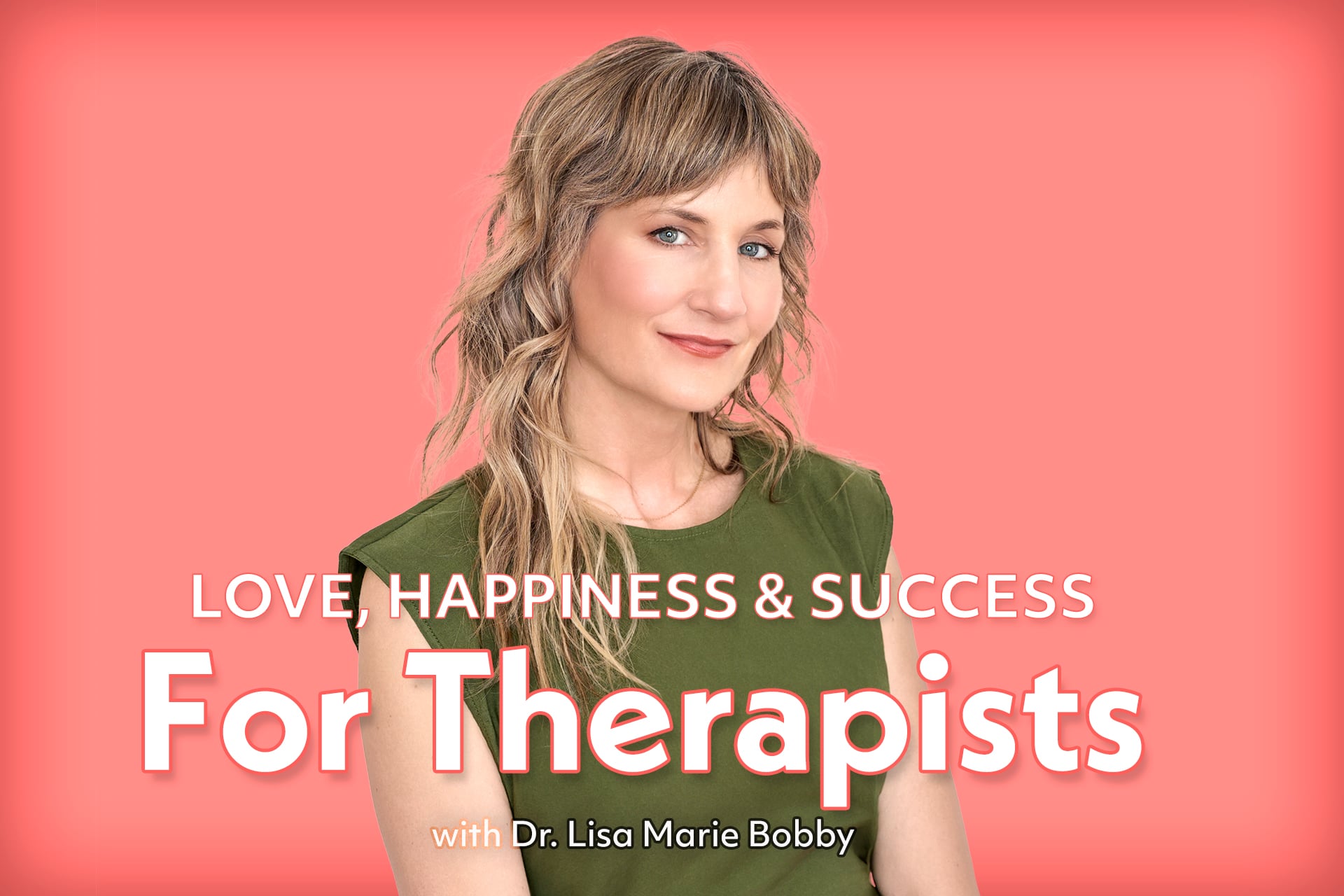Why Relationships Fail
The Love, Happiness & Success Podcast with Dr. Lisa Marie Bobby
Relationships fail when couples don’t know how to solve problems together, and they lose hope that things can get better. Fortunately, it is possible to fix a failing relationship and build a stronger connection.
Secret bank accounts. Illicit rendezvous with the babysitter. Biweekly fights that end in split lips and phone calls to the police.
We’ve all heard about “those” relationships, haven’t we? And maybe we’ve even witnessed something close to them playing out between people we know. It’s no surprise when unions with such obvious markers of pain and dysfunction go down in flames. They may even make us feel a little better about our own relationships, or the kind of partners we are. Sure, we’re imperfect, but we would never do that.
But, as a longtime marriage counselor and couples therapist, trust me when I say that most relationships that fail don’t go down in a big, dramatic burst of flames that everyone sees coming from a hundred miles away. To paraphrase Hemingway, they tend to end gradually, and then all at once. The little injuries that add up to a divorce or a breakup usually seem insignificant while they’re happening, until their cumulative damage is too much for the couple to bear.
When two people who love each other aren’t able to make their relationship work, it’s sad. Because “making it work” is usually a matter of building certain skills, which anyone can do with knowledge and practice. I created this article to illustrate that for you. My hope is that it will give you a clear understanding of what really tanks relationships, and how you can avoid that outcome in your own.
(Psst…I’ve also recorded an episode of the Love, Happiness and Success podcast on this topic. You can tune in on this page, Apple podcasts, Spotify, or wherever you get your podcast, or continue reading the article below.)


Haunted by your ex?
How to Heal, Grow, and Let Go…
Healing after a relationship loss happens in stages. If you can’t let go, it means that you’ve gotten stuck somewhere in the process. Let’s break you free.
Take this free, two-minute quiz to discover exactly what stage you need to work through, and what to do next in order to heal, grow, and move forward.
Why Do Relationships Fail?
Many of the moments that destroy relationships look like no big deal while they’re happening. They can take the shape of “petty” disagreements, too insignificant to pose a real threat to something as important as your marriage.
But over time, these minor disagreements certainly can pose a threat. They can carry more emotional weight than you might expect, bringing up questions about love, safety, trust, and respect between yourself and your partner. If they’re not handled with care, these “petty” disagreements will undermine your connection, and can eventually cause you to lose what you value the most in the world.
Here are some hallmarks of the destructive conflict cycle that causes relationships to fail. By breaking these common patterns, you and your partner can begin to navigate conflict in a way that helps you grow together, not apart.
Why Relationships Fail: Defensiveness
Imagine that your partner is furious about something that doesn’t seem particularly important to you. Maybe you wore your shoes in the house when they’ve repeatedly asked you not to, or you were ten minutes late meeting them for dinner.
What’s your reaction to their anger? Do you feel like you’re being punished harshly for something that doesn’t mean much, considering how much you do for your partner every day? Do you remind them of all the sacrifices you’ve made for them or for the relationship, or of all the things they do that you don’t like?
That’s defensiveness, which is a totally normal reaction to feeling criticized or under attack. Unfortunately, when we get defensive, we can’t really hear our partners. We’re too busy arguing them out of their perspective to hear the hurt or the pain underneath their complaints, because what they’re saying feels like a threat to us.
When one partner is angry and the other is defensive, you get stuck. You can’t move forward into repairing the rift that’s opened up between you and deepening your understanding of each other, because you’re locked in a stalemate of “attack” and “counterattack.” Your partner gets the message that, when they’re upset, their feelings will be met with hostility. Eventually, they’ll stop bringing problems to you, and resentments will build.
So, what’s the antidote to defensiveness? Responsibility. When your partner is upset with you, try to take responsibility for your part in the conflict. That doesn’t mean you have to assume blame that isn’t yours, or always let them “win.” But admit where you’re wrong, and take an interest in their feelings about the situation. You’ll find that you’re able to have a real conversation at that point, and to resolve small problems before they grow into something more serious.
Why Relationships Fail: Emotional Invalidation
Emotional invalidation is another common cause in failing relationships. When we emotionally invalidate our partners, we might agree with their perceptions — that we were late, that we did wear our shoes in the house — but disagree with their emotional reaction to what happened. We might tell them they’re overreacting, or that we can’t understand what they’re so upset about.
Invalidation happens all the time. I would bet that, at some point in your relationship, you have invalidated your partner, and that your partner has invalidated you. Invalidation doesn’t make you a terrible person (or a gaslighter, for that matter). Most of us don’t even realize when we’re being invalidating; we usually think we’re being helpful, encouraging our partners to let go of bad feelings or see things from another, more positive perspective.
But chronic emotional invalidation leaves your partner with the impression that you don’t care about their experience, that you don’t take their emotions seriously, and that there’s no point in trying to resolve problems with you, because they’ll only be dismissed. If your partner comes to expect invalidation from you, they’ll likely begin to withdraw from the relationship. Eventually, this will destroy your connection.
To avoid invalidating your partner, practice listening to them, without trying to “fix” their problems or argue them out of their perspective. Practice accepting their emotional reality for what it is, rather than trying to convince them that the way they feel isn’t reasonable. I use the word practice deliberately here — validating is a habit that we all must build with intention.
Why Relationships Fail: Broken Trust
Minor conflicts that spin out into defensiveness and invalidation have a damaging effect on your bond to your partner. That’s because they lead to broken trust, which is enough to take down even the most loving relationships.
Over time, if you dismiss your partner’s feelings and concerns as unimportant or overblown, they will stop trusting you. I’m not being dramatic when I say that — they will learn that you’re not an emotionally safe person who will treat their needs, feelings, and perspective as valid and important. And that’s what we need from our partners, more than from anyone else in the world.
What happens when your partner stops trusting you? They stop being vulnerable with you, and they stop leaning on you in times of need. They might give up on trying to connect with you on a deep emotional level, and settle for a superficial relationship that begins to feel lonely and hollow to you both. They won’t assume that your intentions are good, and conflicts in your relationship will become more bitter and more damaging as time goes on. Eventually, if something doesn’t change, your relationship will disintegrate.
So how do you repair broken trust, once it’s been damaged? You can start by listening to your partner, validating their feelings, empathizing with them, and taking responsibility for your part in conflicts, rather than reacting with defensiveness.
This all might sound like I’m telling you to let your partner have their way, or to disregard your own needs, rights, and feelings in favor of your partner’s. That’s not the case — you also deserve to be heard, and to have empathy and validation when you’re upset. But you won’t get that by “winning” the argument or by being the most correct. You’ll get it by extending generosity and kindness toward your partner, which will make them more willing to reciprocate with kindness and generosity in return.
How to Fix a Failing Relationship
If I could impart one bit of wisdom to every couple, from my many years as both a married person and as a marriage counselor, it would be this: When marriages fail, it’s usually not in a high-drama, crash and burn scenario. The kind of dissolution that makes for an intriguing TV plot line is rarely what I see play out between actual couples who arrive in my office.
Instead, marriages fail when two people who love each other don’t have the skills to navigate everyday conflict in a healthy, supportive way that helps their relationship grow. Over time, these conflicts turn corrosive, and their relationships become damaged beyond the point of repair until someone calls it quits in the relationship.
But you can build relationship skills, and your relationship will be stronger and healthier for it. Skills like:
- Healthy communication
- Emotional validation
- Having conflict without defensiveness
- Building emotional intimacy
- Helping your partner feel appreciated and loved
- Compromising
You can practice these skills, and they can help you save a failing relationship, while making your connection stronger than ever before. But, most people need some outside support — especially if your relationship is already in trouble. Making big, fundamental, positive shifts in your relationship system is easier, faster, and more successful with help from a good couples counselor. If you would like to do this valuable work with a relationship expert on my team, I invite you to schedule a free consultation.
xoxo,
Dr. Lisa Marie Bobby
P.S. — For more advice on fixing your relationship, see my “relationship repair” collection of articles and podcasts. I made it for you!
Citations
- Scott SB, Rhoades GK, Stanley SM, Allen ES, Markman HJ. Reasons for Divorce and Recollections of Premarital Intervention: Implications for Improving Relationship Education. Couple Family Psychol. 2013 Jun;2(2):131-145. doi: 10.1037/a0032025. PMID: 24818068; PMCID: PMC4012696.
Music in this episode is by Nocturne Blue, covering “Ship of Fools” by World Party.
You can support them and their work by visiting their Bandcamp page here: https://nocturneblue.bandcamp.com/. Under the circumstance of use of music, each portion of used music within this current episode fits under Section 107 of the Copyright Act, i.e., Fair Use. Please refer to copyright.gov if further questions are prompted.




